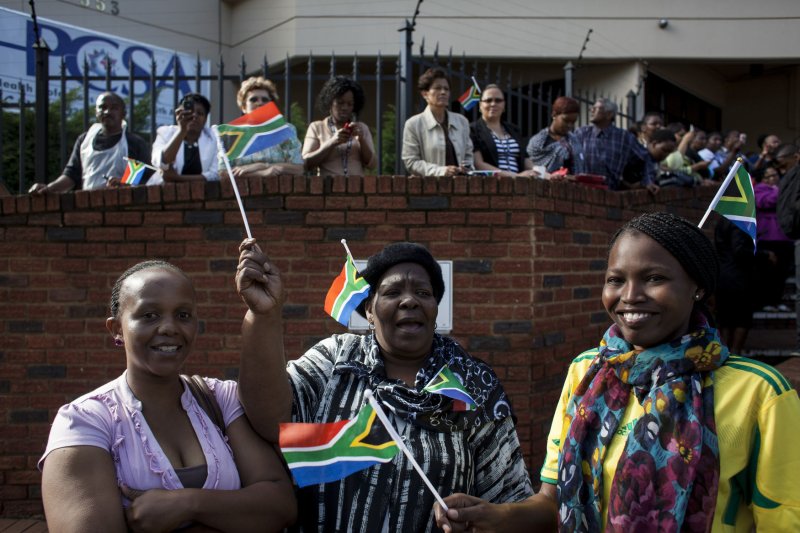People pay their respects as the body of former South African president Nelson Mandela is transported to the Union Buildings in Pretoria, South Africa, where it will lie in state for the public to view on December 12, 2013. Mandela will be buried on December 15th. UPI/Charlie Shoemaker |
License Photo
NEW YORK, Dec. 24 (UPI) -- With the film "Mandela: Long Walk to Freedom" scheduled for U.S. release Christmas Day, a former fellow prisoner remembers how he and the anti-apartheid revolutionary who became South Africa's president spent the holiday during their five years together in prison.
Christmas was marked by "camaraderie, mutual sharing and [a] lighter spirit" than usual, but no gifts or special food, said Saths Cooper, then a member of the anti-apartheid Black Consciousness Movement. Their biggest moment was to have a visitor -- and that didn't happen unless Christmas fell on a weekend.
Cooper, president of the International Union of Psychological Science, was in his 20s in 1977, when he and Nelson Mandela spent their first Christmas together at notorious Robben Island Maximum Security Prison off the coast of Cape Town. Mandela was 59.
Mandela, who Cooper affectionately refers to by his clan name "Madiba," had been at Robben Island since 1964, serving a life sentence after being convicted of conspiracy to overthrow the state. Cooper, joining Mandela in October 1977, was sentenced to 10 years for supporting Mozambique's independence movement.
Over the five-year period, the older and younger activists often disputed politics. Cooper considered Mandela's multiracial approach to ending apartheid a form of apartheid itself. He advocated a black identity separate from any white or multiracial identity.
But discussing any of this was dangerous, no matter what the occasion, Cooper said via email.
"All such information was strictly coded, as we were precluded from talking about other prisoners, politics, and generally what was going on inside and outside prison," he said.
"However, Madiba was given some latitude to discuss family members who were political, as he'd made a case that these figures were responsible for taking care of his family whilst he was in prison."
If Christmas fell on a day other than a weekend, Mandela and Cooper had to wait until the following weekend's normal visiting hours to be able to have a visitor, he said.
Winnie Mandela, Mandela's wife at the time, "usually visited Madiba and invariably sent her good wishes to me," said Cooper, who knew Winnie Mandela since 1969.
Cooper said he was usually visited by his wife or mother.
"We'd share information from those visits, sated with good memories," he said.
Visits weren't private but rather conducted by phone through Plexiglas, with one prison guard, known as a "warder," next to the prisoner and another next to the visitor.
"Our time out of our cells on holidays and weekends was from after 8 a.m. till just before 4 p.m.," Cooper said.
Christmas gifts weren't allowed in prison. Inmates could receive money for toiletries, writing materials and food items. The money was kept by the prison.
Communication by letter was also limited, Cooper said.
Cooper allowed himself to be considered a "B-Group Prisoner," "which entitled me to an extra letter and visit per month," he said, explaining that he and his fellow post-1976 prisoners refused to be classified, "as we likened this to racial classification."
Mandela was an "A-Group Prisoner," which gave him more purchasing privileges, Cooper said.
Christmas cards were allowed, "but a card was construed as a letter and many of us preferred letters with more content," Cooper said.
Even with a letter, "censorship was severe," he said.
"I often got a letter starting, 'Dear/est Saths, I wish to ...'" followed by "a window/cutout by the censors, with another line in the middle of the page, followed by another window, the pieces patched together with cello tape," Cooper said.
"So you see, 'Windows' appeared in prison long before Mac and Microsoft made them famous!" Cooper joked.
Yet Christmas still held its magic, Cooper said.
"We tended to feel the burden of imprisonment a little less and there was something akin to cheer that we allowed to envelop us," he said.
--
(Judy Kuriansky, a New York clinical psychologist at Columbia University Teachers College and chairwoman of the Psychology Coalition at the United Nations, is a trustee of the New York City Peace Museum and editor of "Beyond Bullets and Bombs: Grassroots peacebuilding between Israelis and Palestinians," who has known Dr. Saths Cooper for years and profiled him on video at http://www.youtube.com/watch?v=eA6yb5xt1hQ.)
--
(United Press International's "Outside View" commentaries are written by outside contributors who specialize in a variety of important issues. The views expressed do not necessarily reflect those of United Press International. In the interests of creating an open forum, original submissions are invited.)















